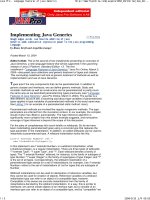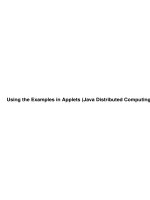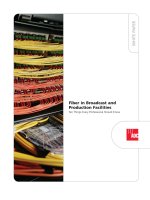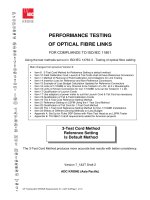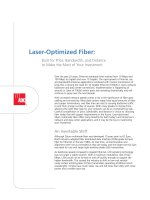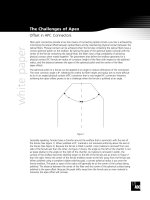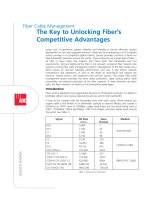Tài liệu New Features Guide pptx
Bạn đang xem bản rút gọn của tài liệu. Xem và tải ngay bản đầy đủ của tài liệu tại đây (1.28 MB, 126 trang )
Oracle® Database
New Features Guide
10g Release 1 (10.1)
Part No. B10750-01
December 2003
Oracle Database New Features Guide, 10g Release 1 (10.1)
Part No. B10750-01
Copyright © 2001, 2003 Oracle Corporation. All rights reserved.
Contributors: Mateo Burtch, Paul Lane, Diana Lorentz, Mark Townsend, Sandra Cheevers, Michael
Hartstein, Neal Brenner
The Programs (which include both the software and documentation) contain proprietary information of
Oracle Corporation; they are provided under a license agreement containing restrictions on use and
disclosure and are also protected by copyright, patent and other intellectual and industrial property
laws. Reverse engineering, disassembly or decompilation of the Programs, except to the extent required
to obtain interoperability with other independently created software or as specified by law, is prohibited.
The information contained in this document is subject to change without notice. If you find any problems
in the documentation, please report them to us in writing. Oracle Corporation does not warrant that this
document is error-free. Except as may be expressly permitted in your license agreement for these
Programs, no part of these Programs may be reproduced or transmitted in any form or by any means,
electronic or mechanical, for any purpose, without the express written permission of Oracle Corporation.
If the Programs are delivered to the U.S. Government or anyone licensing or using the programs on
behalf of the U.S. Government, the following notice is applicable:
Restricted Rights Notice Programs delivered subject to the DOD FAR Supplement are "commercial
computer software" and use, duplication, and disclosure of the Programs, including documentation,
shall be subject to the licensing restrictions set forth in the applicable Oracle license agreement.
Otherwise, Programs delivered subject to the Federal Acquisition Regulations are "restricted computer
software" and use, duplication, and disclosure of the Programs shall be subject to the restrictions in FAR
52.227-19, Commercial Computer Software - Restricted Rights (June, 1987). Oracle Corporation, 500
Oracle Parkway, Redwood City, CA 94065.
The Programs are not intended for use in any nuclear, aviation, mass transit, medical, or other inherently
dangerous applications. It shall be the licensee's responsibility to take all appropriate fail-safe, backup,
redundancy, and other measures to ensure the safe use of such applications if the Programs are used for
such purposes, and Oracle Corporation disclaims liability for any damages caused by such use of the
Programs.
Oracle is a registered trademark, and Oracle8i, Oracle9i, OracleMetaLink, Oracle Store, PL/SQL,
Pro*C/C++, Pro*COBOL, Pro*FORTRAN, Pro*PL/1, SQL*Plus, and iSQL*Plus are trademarks or
registered trademarks of Oracle Corporation. Other names may be trademarks of their respective
owners.
iii
Contents
Send Us Your Comments xvii
Preface xix
Audience xix
Organization xix
Related Documentation xx
Conventions xx
Documentation Accessibility xxv
1 Oracle Database 10g, Release 1 New Features
Introduction 1-2
Server Manageability 1-2
Server Configuration 1-3
Simplified Database Install 1-3
Automatic Storage Management Configuration 1-3
Automatic Oracle Real Application Clusters Services Configuration 1-3
Simplified Upgrade for RAC and Oracle Parallel Server Databases 1-4
Automatic Oracle Enterprise Manager Configuration 1-4
Automatic Integrated Clusterware Installation 1-4
Automatic Configuration of Recovery Area 1-4
Out-of-the-Box LDAP Configuration 1-4
Simplified Initialization Parameters 1-4
Default User Tablespace 1-4
Easy Upgrade 1-4
iv
Upgrade Information Tool 1-5
Network Management 1-5
Back Up Directory Naming Entries to Local Naming File 1-5
Dynamic Connection Manager Configuration 1-5
Easy Connect Naming Method 1-5
Improved Network Outage Detection 1-6
Automatic LDAP Discovery for Clients 1-6
Improved Connection Manager Access Rules 1-6
Automatic Shared Server Configuration 1-6
Simplified Shared Server Configuration Parameters 1-6
Manageability Infrastructure 1-6
Database Features Usage Tracking 1-7
Enhanced Database Time Model 1-7
End-to-End Application Tracing 1-7
JDBC: End-to-End Tracing 1-7
SYSAUX Tablespace 1-7
Automatic Routine Administration Tasks 1-7
Server-Generated Alerts 1-7
Automatic Workload Respository 1-8
Enhanced Wait Model 1-8
Threshold-Based Alerts 1-8
Storage Management 1-8
Multiple Default Temporary Tablespace Support for SQL Operations 1-8
Automatic Storage Management 1-8
Rename Tablespace 1-9
Space, Object, and Transaction Management 1-9
Automatic Undo Retention Tuning 1-9
Segment Advisor 1-9
New Segment Resource Estimation 1-10
Online Segment Shrink 1-10
Proactive Tablespace Management 1-10
Undo Advisor 1-10
Backup and Recovery Manageability 1-10
Enhanced RMAN Reporting 1-10
Backup Compression 1-10
v
Bounded Backup Window 1-11
RMAN Scripts Manageability 1-11
Recovery Area Full Alert 1-11
Instance Tuning 1-11
User-Initiated Buffer Cache Flushing 1-11
Database Resource Manager - Adaptive Consumer Group Mapping 1-11
New Performance Overview Charts in Oracle Enterprise Manager 1-12
Improved SQL Reporting Using Oracle Enterprise Manager 1-12
Automatic Database Diagnostic Monitor 1-12
Redo Logfile Sizing Advisor 1-12
Automatic Checkpoint Tuning 1-12
Automatic Shared Memory Tuning 1-12
Transaction Rollback and Recovery Monitoring 1-12
Application Tuning 1-13
SQL Tuning Advisor 1-13
SQLAccess Advisor 1-13
Materialized View Tuning API 1-13
Automatic Optimizer Statistics Collection 1-13
Database Overall 1-14
Utilities 1-14
SQL*Plus - glogin.sql Changes 1-14
SQL*Plus - Show Recycle Bin 1-14
SQL*Plus - Run glogin.sql and login.sql After Each CONNECT 1-14
SQL*Plus - DBMS_OUTPUT After SELECT 1-14
SQL*Plus - COMPATIBILITY Command Line Option 1-15
SQL*Plus - SET SQLPROMPT Runtime Variable Substitution 1-15
SQL*Plus - SPOOL CREATE, REPLACE, and APPEND Options 1-15
Data Pump Data Load/Unload 1-15
iSQL*Plus - Output Over Multiple Pages 1-15
iSQL*Plus Input Prompting 1-15
Performance and Scalability 1-15
Overall 1-16
Index-Organized Table (IOT) Partitioning Enhancements 1-16
Eliminate Duplicated Columns in Index on an Index-Organized Table 1-16
Configurable TCP/IP Send and Receive Buffer Size 1-16
vi
Single-Set Aggregates in DML Returning Clause 1-16
High-Speed Infiniband Network Support 1-16
Sorted Hash Clusters 1-17
Windows Fiber Support 1-17
Optimized 64-bit Database 1-17
SQL Tuning Advisor 1-17
SQLAccess Advisor 1-17
Materialized View Tuning API 1-17
Automatic Optimizer Statistics Collection 1-17
Clustering 1-18
Oracle Real Application Clusters Enhancements 1-18
Integrated Clusterware Management 1-18
Automatic Workload Management 1-18
Single System Image Management 1-18
Fast Connection Failover 1-19
Performance Improvements 1-19
Zero Downtime Patching 1-19
Cluster Verification and Improved Diagnostic Tools 1-19
Grid Computing 1-19
Resource Virtualization and Provisioning 1-19
Resonance 1-20
Transparent Session Migration 1-20
Streams - Moving an Operating System File 1-20
Streams - Simple Instantiation of Replica Tablespaces and Databases 1-20
Integrated Clusterware Management 1-20
High-Speed Infiniband Network Support 1-20
Fast Connection Failover 1-21
Automatic Storage Management 1-21
Cross-Platform Transportable Tablespaces 1-21
Data Pump Export and Import Utilities 1-21
Streams - Instantiation Through RMAN 1-21
Streams - Instantiation Through Transportable Tablespaces 1-22
Streams - Instantiation Through Data Pump 1-22
Workload Management 1-22
Automatic Workload Management 1-22
vii
Database Resource Manager - Adaptive Consumer Group Mapping 1-22
Scheduler - Job Processing 1-22
Scheduler - Usability and Manageability 1-23
Scheduler - Support for Jobs in a Clustered Environment 1-23
Information Integration 1-23
Improved Information Integration Performance 1-23
Transparent Gateway - Remote Stored Functions in SELECT Statements 1-23
Oracle Streams 1-24
JMS 1.3-Compliant JDBC - Thin Driver Support 1-24
OJMS Queue and Topic Unification Support 1-24
Oracle Messaging Gateway - MQSeries JMS Interface 1-24
Oracle Messaging Gateway - OJMS (AQ/JMS) Interface 1-24
Oracle Messaging Gateway - Tibco/Rendezvous Java Interface 1-24
Streams - Batch Enqueue/Dequeue 1-25
Advanced Replication to Streams Migration Tool 1-25
Streams - Support Delete Cascade Operations 1-25
Streams - Enqueue Handler 1-25
Streams - Access to Client Information During Processing 1-25
Streams - Descending and Function-Based Index Support 1-25
Streams - Precommit Handlers 1-25
Streams - Negative Rules 1-25
Streams - Rules Engine - Easy Rules Engine Transformation Management 1-26
Streams - Row Subsetting During Capture and Propagation 1-26
Streams - Additional Streams Datatype and IOT Support 1-26
Streams - Access to Additional LCR Attributes 1-26
Streams - Instantiation Through Data Pump 1-26
Streams - Clean Up Rules Sets 1-26
Streams - Buffer Queue Monitoring 1-26
Streams - Message Notification 1-26
Streams - Allocate Memory from Streams Pool 1-26
Streams - High-Level API for Message Queuing 1-27
Streams - Easier Transformation Monitoring 1-27
Streams - Improved Capture and Apply Error Handling 1-27
Streams - Instantiation Through RMAN 1-27
Streams - Expose Commit Order of Changes 1-27
viii
Streams - Clean Up LogMiner Information 1-27
Streams - Set Instantiation SCN at Apply Site 1-27
Streams - Views to Monitor Instantiation Data 1-27
Streams - New APIs to Grant Privileges 1-28
Improved Streams Oracle Real Application Clusters Support 1-28
Streams - Downstream Capture 1-28
Streams - Instantiation Through Transportable Tablespaces 1-28
OCCI Support for Streams AnyData Queues 1-28
Streams - Enhanced Capture and Apply Performance 1-28
Streams - Performance Enhancements for AnyData 1-28
Rules Engine - Rules Enhancements 1-28
The Scheduler 1-29
Scheduler - Core Scheduler Features 1-29
Scheduler - Usability and Manageability 1-29
Scheduler - Monitoring 1-30
Scheduler - Job Processing 1-30
Scheduler - Recovery 1-30
Scheduler - Support for Jobs in a Clustered Environment 1-30
Scheduler - ILMS Support 1-30
Scheduler - Increased Throughput 1-30
Scheduler - Dynamic Slave Pool 1-31
Scheduler - Redo Minimization 1-31
Availability 1-31
Backup and Recovery 1-31
Flash Backup and Recovery 1-31
Drop Database 1-32
RMAN Database Deregistration 1-32
Backup and Restore of Standby Control File 1-32
Automatic TSPITR 1-32
Simplified Recovery Manager Cataloging of Backup Files 1-32
Automatic Channel Failover for Backup and Restore 1-32
Automatic File Creation During Recovery 1-32
Simplified Backups to Disk 1-32
Proxy Copy Backup of Archivelogs 1-33
Incrementally Updated Backups 1-33
ix
Simplified Recovery Through Resetlogs 1-33
Restore Tolerates Corrupt or Missing Backups 1-33
Full Database Begin Backup Command 1-33
Change-Aware Incremental Backups 1-33
Enhanced Oracle Data Guard Infrastructure 1-34
Data Guard Broker Support for RAC 1-34
Automatic LogMiner Configuration 1-35
Log Miner Support for Index-Organized Tables 1-35
LogMiner Support for More Types: LONG, Multibyte CLOB and NCLOB 1-35
Fine-Grained Supplemental Logging 1-35
Secured Redo Transmission 1-35
Uniquely Named Databases with DB_UNIQUE_NAME 1-35
Simplified Zero Data Loss for Data Guard SQL Apply 1-35
Zero Downtime Instantiation for SQL Apply 1-36
Real Time Apply 1-36
Automating Recovery Through Open Resetlogs in Standby Databases 1-36
Recovering from Human Error with Flashback Technology 1-36
Oracle Flashback Database 1-36
Oracle Flashback Table 1-37
Oracle Flashback Version Query 1-37
Oracle Flashback Drop 1-37
Oracle Flashback Transaction Query 1-37
Reduced Downtime for Application and Database Upgrades 1-37
Enhanced Online Redefinition 1-38
Rolling Upgrades with SQL Apply 1-38
Signature-Based Dependency Tracking Using Synonyms 1-38
Security and Directory 1-38
Improved Administration 1-39
DML Support in FGA 1-39
Communication over SASL 1-39
Unified User Model 1-39
Easy Database Registration 1-39
Extended and Uniform Audit Trail 1-39
Oracle Label Security Directory Integration 1-40
Integration and Interoperability 1-40
x
Certificate Validation with Certificate Revocation Lists (CRLs) 1-40
Centralized CRL Management 1-40
Centralized User Management for Kerberos Users 1-40
Kerberos-Enabled Database Links 1-40
Operating System Credential Cache 1-41
Access to Single Sign On Wallet 1-41
Key Store Interface 1-41
Database Authentication with Standard LDAP Password Verifiers 1-41
Single Station Administration for Password Authentication to Oracle Database 1-41
Smart Card Support for X509v3 Certificates 1-41
Transport Layer Security (TLS) Support 1-41
SSL Session Renegotiation 1-42
4096-Bit Key Size Support 1-42
Performance Improvements 1-42
Security and Privacy 1-42
VPD Support for Parallel Query 1-42
VPD Static and Dynamic Policies 1-42
Column-Level VPD 1-42
Business Intelligence 1-43
Bioinformatics 1-43
BLAST Queries 1-43
Statistical Functions 1-43
Document Clustering 1-43
Support Vector Machines 1-44
Document Named Entity Extraction 1-44
Data Mining Support for Analytic Applications 1-44
Frequent Itemsets 1-44
DBMS_DATA_MINING PL/SQL Interface for Oracle Data Mining 1-44
Features Extraction using Non-Negative Matrix Factorization Algorithm 1-45
Enhanced Data Preprocessing 1-45
Enhanced Adaptive Bayes Network 1-45
Multi-User Access Control 1-45
Oracle Data Mining Client (DM4J) 1-45
Support Vector Machines (SVM) 1-45
Improved Very Large Database (VLDB) Support 1-45
xi
Bigfile Tablespace 1-46
Enhanced Partition Management in Oracle Enterprise Manager 1-46
Global Partitioned Indexes - Hash Partitioning 1-46
Partitioned Index-Organized Tables - List Partitioning 1-46
Partitioned Index-Organized Tables - Global Index Maintenance 1-46
Partitioned Index-Organized Tables - LOB Support 1-46
Enhanced Bitmap Index Performance and Space Management 1-46
Local Partitioned Indexes Manageability Improvements 1-47
OLAP Support for Analytic Applications 1-47
Parallel AGGREGATE Command 1-47
Parallel SQL IMPORT Command 1-48
PL/SQL Creation of Analytic Workspaces 1-48
Intra-Dimensional (Attribute) Aggregation 1-48
Enhanced Composite Dimensions Indexing 1-48
PL/SQL OLAP Measure Calculation Definition 1-48
Complete Analytical Workspace Management 1-48
Multi-Writer Support 1-48
XML Interface for Analytic Workspace 1-49
Reduced Information Cycle Time 1-49
Asynchronous Change Data Capture 1-49
Cross-Platform Transportable Tablespaces 1-49
Enhanced Table Functions 1-49
External Tables Unload 1-49
Enhanced MERGE Functionality 1-50
Data Pump Export and Import Utilities 1-50
Parallel Data Pump Export and Import 1-50
SQL*Loader Direct-Path Load Support for ROWID Datatype 1-50
SQL*Loader Direct-Path Load Support for VARRAY Datatype 1-50
SQL*Loader Direct-Path Load Support for XMLType Tables 1-50
SQL Support for Analytic Applications 1-51
Partition Outer Join 1-51
Increased Number of Aggregates per Query 1-51
SQL MODEL Clause 1-52
Upsert Through SQL Model Calculations 1-52
Summary Management OLAP Query Performance Improvements 1-52
xii
Summary Management - Enhanced Partition-Aware Materialized View Refresh 1-52
Summary Management - EXPLAIN PLAN Shows Materialized View Access 1-52
Summary Management - Enhanced Dimensions 1-52
Summary Management - Nested Materialized View Refresh 1-52
Summary Management - Enhanced PCT Refresh 1-53
Content Management 1-53
Improved Multimedia Support 1-53
ISO/IEC 13249-5 SQL Multimedia Still Image Support 1-53
Terabyte-Size LOBs 1-53
Java Advanced Imaging 1.1.1_01 Support 1-54
Native Support for Additional Audio/Video Media Formats 1-54
Improved Text Globalization Capabilities 1-54
Document Character Set and Language Detection 1-54
New German Spelling Rules Support 1-54
Chinese GB18030 Character Set Support 1-54
Enhanced Japanese Language Support 1-55
Improved Text Manageability and Usability 1-55
Text Classification and Routing 1-55
Classification Training Set Wizard for JDeveloper 1-55
Thesaurus Manager 1-55
Catalog Wizard for JDeveloper 1-55
Text Wizard for JDeveloper 1-55
Indexless Document Services 1-55
Progressive Text Query Relaxation 1-56
Query Log Analysis 1-56
Multipart MIME Filter 1-56
Highlighting for INPATH and HASPATH Operators 1-56
Positional Operator 1-56
Improved Text Quality of Retrieval 1-56
Link Analysis 1-56
NEAR-ACCUM Text Operator 1-56
Theme Proximity Searching 1-56
Location Services 1-57
Overall 1-57
GeoRaster Support 1-57
xiii
Spatial Analytics and Geocoder 1-57
Network Data Model 1-57
Topology Data Model 1-58
Spatial Index Updates and Queries - Performance Improvements 1-58
Parallel Spatial Queries 1-58
OpenGIS Simple Features Specification Conformance 1-58
Workspace Manager Event Management 1-58
Enhanced Workspace Manager Usability 1-59
Enhanced Workspace Manager Database Support 1-59
Application Development 1-59
Database Centric Application Development Environment 1-59
Service Administration 1-59
SQL Workshop 1-59
Data Workshop 1-60
Application Builder 1-60
Globalization and Unicode 1-60
Globalization Development Kit 1-60
Character Set Scanner Utilities 1-61
Database Character Set Scanner CSALTER Script 1-61
Expanded Locale Coverage 1-61
Unicode 3.2 Support 1-61
CLOB and NCLOB Implicit Conversions 1-61
Java, JDBC, and Web Services 1-62
JDBC Thin Driver PL/SQL Index Table 1-62
JDBC 3.0 Named Parameter 1-62
SOAP Client for Database Web Services 1-62
Java-in-Database Web Services 1-62
SQL Query Web Services 1-63
Web Services Data Source 1-63
Enhanced PL/SQL Web Services 1-63
Consuming External Web Services from SQL and PL/SQL 1-63
Consuming External Web Services from Database Using Java 1-63
SQL DML Web Services 1-63
OracleJVM: Native Java Interface 1-63
Enhanced JDBC VARRAY Support 1-64
xiv
JDBC IEEE DOUBLE and FLOAT Datatypes 1-64
JDBC LONG to LOB Conversion 1-64
JDBC INTERVAL DAY TO SECOND 1-64
JDBC RAC/HA Fast Connection Failover 1-64
JDBC 3.0 J2EE Connector Architecture Resource Adapter 1-64
JDBC 3.0 DATALINK Datatype and Ref Interface 1-64
JDBC Web RowSet 1-64
OracleJVM J2SE 1.4.x Compatibility 1-65
Implicit JDBC 3.0 Connection Caching 1-65
JDBC Connection Cache Manager 1-65
Other APIs and Precompilers 1-65
Instant Client 1-65
OCCI Globalization Support 1-65
OCCI Stateless Connection Pooling 1-66
OCCI Performance Improvements 1-66
OCCI Statement Caching 1-66
OCCI XA Support 1-66
Preserved User Code in OTT-Generated Classes 1-66
PL/SQL Improvements 1-66
Sparse Table Bulk Binds 1-67
Collection Set Operations 1-67
Database Storage of PL/SQL Native Compilation Units 1-67
Fine-Grained Debug Privileges 1-67
Regular Expressions 1-67
User-Specified Quoting Character 1-67
UTL_COMPRESS Package 1-68
UTL_MAIL Package 1-68
Compile-Time Warnings 1-68
DBMS_PROFILER Improvements 1-68
PL/SQL Optimizing Compiler 1-68
SQL Language Improvements 1-68
Case-Insensitive and Accent-Insensitive Query and Sort 1-69
BINARY_DOUBLE and BINARY_FLOAT Datatypes 1-69
Enhanced Collections 1-69
Enhanced CONNECT BY Support 1-69
xv
Expression Filter 1-70
Extensible Indexing 1-70
SQL Regular Expressions 1-70
Row Timestamp 1-70
XML Application Development Support 1-71
SQL/XML Standard Compliance 1-71
Oracle XML DB LDAP Access Performance 1-71
XML DB Schema Evolution 1-72
XML Processing Performance Improvements 1-72
XML Transformation Performance Improvements in C/C++ 1-72
XML DB Internationalization 1-72
Extended XML Standard Support in C/C++ 1-72
Extended XML Standard Support in Java 1-72
XML Transformation and Querying Performance Improvements in Java 1-73
High Performance XML - Java 1-73
XML DB XMLType View Performance 1-73
Windows 1-73
Data Access Support 1-73
Oracle Objects for OLE Support for Oracle Datatypes and Grid 1-74
ODP.NET Support for Advanced Oracle Features 1-74
ODP.NET Support for XML DB 1-74
Operating System Integration 1-74
Optimized 64-bit Database 1-74
Oracle Services for Microsoft Transaction Server Support 1-75
2 Oracle Database 10g Documentation
Documentation Titles and Online Documentation Structure 2-1
Oracle Database 10g Server and SQL*Plus Documentation 2-2
Oracle Data Mining Documentation 2-12
Oracle Spatial Documentation 2-12
Oracle OLAP Documentation 2-13
Oracle Database10g Documentation for Windows 2-14
Java Documentation 2-15
xvi
Oracle Enterprise Manager Documentation 2-16
Index
xvii
Send Us Your Comments
Oracle Database New Features Guide, 10g Release 1 (10.1)
Part No. B10750-01
Oracle Corporation welcomes your comments and suggestions on the quality and usefulness of this
publication. Your input is an important part of the information used for revision.
■ Did you find any errors?
■ Is the information clearly presented?
■ Do you need more information? If so, where?
■ Are the examples correct? Do you need more examples?
■ What features did you like most about this manual?
If you find any errors or have any other suggestions for improvement, please indicate the title and
part number of the documentation and the chapter, section, and page number (if available). You can
send comments to us in the following ways:
■ Electronic mail:
■ FAX: (650) 506-7227 Attn: Server Technologies Documentation Manager
■ Postal service:
Oracle Corporation
Server Technologies Documentation
500 Oracle Parkway, Mailstop 4op11
Redwood Shores, CA 94065
USA
If you would like a reply, please give your name, address, telephone number, and electronic mail
address (optional).
If you have problems with the software, please contact your local Oracle Support Services.
xviii
xix
Preface
This book introduces the features, options, and enhancements that are new with this
Oracle Database release. This book also provides readers with a list of titles and a
brief description of the technical documentation available with this release.
This preface contains these topics:
■ Audience
■ Organization
■ Related Documentation
■ Conventions
■ Documentation Accessibility
Audience
Oracle Database New Features Guide is addressed to people familiar with previous
versions of the Oracle Database who would like to become familiar with features,
options, and enhancements that are new in this release of the database.
Organization
This document contains the following chapters:
Chapter 1, "Oracle Database 10g, Release 1 New Features"
This chapter describes the new features of the Oracle Database 10g.
xx
Chapter 2, "Oracle Database 10g Documentation"
This chapter lists technical documentation available with this release of the Oracle
Database 10g and briefly describes the subject matter of each document.
Related Documentation
Printed documentation is available for sale in the Oracle Store at
/>To download free release notes, installation documentation, white papers, or other
collateral, please visit the Oracle Technology Network (OTN). You must register
online before using OTN; registration is free and can be done at
/>If you already have a username and password for OTN, then you can go directly to
the documentation section of the OTN Web site at
/>Oracle error message documentation is only available in HTML. If you only have
access to the Oracle Documentation CD, you can browse the error messages by
range. Once you find the specific range, use your browser's "find in page" feature to
locate the specific message. When connected to the Internet, you can search for a
specific error message using the error message search feature of the Oracle online
documentation.
Conventions
This section describes the conventions used in the text and code examples of this
documentation set. It describes:
■ Conventions in Text
■ Conventions in Code Examples
■ Conventions for Windows Operating Systems
Conventions in Text
We use various conventions in text to help you more quickly identify special terms.
The following table describes those conventions and provides examples of their use.
xxi
Conventions in Code Examples
Code examples illustrate SQL, PL/SQL, SQL*Plus, or other command-line
statements. They are displayed in a monospace (fixed-width) font and separated
from normal text as shown in this example:
Convention Meaning Example
Bold Bold typeface indicates terms that are
defined in the text or terms that appear in
a glossary, or both.
When you specify this clause, you create an
index-organized table.
Italics Italic typeface indicates book titles or
emphasis.
Oracle Database Concepts
Ensure that the recovery catalog and target
database do not reside on the same disk.
UPPERCASE
monospace
(fixed-width)
font
Uppercase monospace typeface indicates
elements supplied by the system. Such
elements include parameters, privileges,
datatypes, RMAN keywords, SQL
keywords,SQL*Plus or utilitycommands,
packages and methods, as well as
system-supplied column names, database
objects and structures, usernames, and
roles.
You can specify this clause only for a NUMBER
column.
You can back up the database by using the
BACKUP command.
Query the TABLE_NAME column in the USER_
TABLES data dictionary view.
Use the DBMS_STATS.GENERATE_STATS
procedure.
lowercase
monospace
(fixed-width)
font
Lowercase monospace typeface indicates
executables, filenames, directory names,
and sample user-supplied elements. Such
elements include computer and database
names, net service names, and connect
identifiers, as well as user-supplied
database objects and structures, column
names, packages and classes, usernames
and roles, program units, and parameter
values.
Note: Some programmatic elements use a
mixture of UPPERCASE and lowercase.
Enter these elements as shown.
Enter sqlplus to open SQL*Plus.
The password is specified in the orapwd file.
Back up the datafiles and control files in the
/disk1/oracle/dbs directory.
The department_id, department_name,
and location_id columns are in the
hr.departments table.
Set the QUERY_REWRITE_ENABLED
initialization parameter to true.
Connect as oe user.
The JRepUtil class implements these
methods.
lowercase
italic
monospace
(fixed-width)
font
Lowercase italic monospace font
represents placeholders or variables.
You can specify the parallel_clause.
Run Uold_release.SQL where old_
release refers to the release you installed
prior to upgrading.
xxii
SELECT username FROM dba_users WHERE username = 'MIGRATE';
The following table describes typographic conventions used in code examples and
provides examples of their use.
Convention Meaning Example
[ ]
Brackets enclose one or more optional
items. Do not enter the brackets.
DECIMAL (digits [ , precision ])
{ }
Braces enclose two or more items, one of
which is required. Do not enter the
braces.
{ENABLE | DISABLE}
|
A vertical bar represents a choice of two
or more options within brackets or braces.
Enter one of the options. Do not enter the
vertical bar.
{ENABLE | DISABLE}
[COMPRESS | NOCOMPRESS]
Horizontal ellipsis points indicate either:
■ That we have omitted parts of the
code that are not directly related to
the example
■ That you can repeat a portion of the
code
CREATE TABLE AS subquery;
SELECT col1, col2, , coln FROM
employees;
.
.
.
Vertical ellipsis points indicate that we
have omitted several lines of code not
directly related to the example.
SQL> SELECT NAME FROM V$DATAFILE;
NAME
/fsl/dbs/tbs_01.dbf
/fs1/dbs/tbs_02.dbf
.
.
.
/fsl/dbs/tbs_09.dbf
9 rows selected.
Other notation You must enter symbols other than
brackets, braces, vertical bars, and ellipsis
points as shown.
acctbal NUMBER(11,2);
acct CONSTANT NUMBER(4) := 3;
Italics
Italicized text indicates placeholders or
variables for which you must supply
particular values.
CONNECT SYSTEM/system_password
DB_NAME = database_name
xxiii
Conventions for Windows Operating Systems
The following table describes conventions for Windows operating systems and
provides examples of their use.
UPPERCASE
Uppercase typeface indicates elements
supplied by the system. We show these
terms in uppercase in order to distinguish
them from terms you define. Unless terms
appear in brackets, enter them in the
order and with the spelling shown.
However, because these terms are not
case sensitive, you can enter them in
lowercase.
SELECT last_name, employee_id FROM
employees;
SELECT * FROM USER_TABLES;
DROP TABLE hr.employees;
lowercase
Lowercase typeface indicates
programmatic elements that you supply.
For example, lowercase indicates names
of tables, columns, or files.
Note: Some programmatic elements use a
mixture of UPPERCASE and lowercase.
Enter these elements as shown.
SELECT last_name, employee_id FROM
employees;
sqlplus hr/hr
CREATE USER mjones IDENTIFIED BY ty3MU9;
Convention Meaning Example
Choose Start > How to start a program. To start the Database Configuration Assistant,
choose Start > Programs > Oracle - HOME_
NAME > Configuration and Migration Tools >
Database Configuration Assistant.
File and directory
names
File and directory names are not case
sensitive. The following specialcharacters
are not allowed: left angle bracket (<),
right angle bracket (>), colon (:), double
quotation marks ("), slash (/), pipe (|),
and dash (-). The special character
backslash (\) is treated as an element
separator, even when it appears in quotes.
If the file name begins with \\, then
Windows assumes it uses the Universal
Naming Convention.
c:\winnt"\"system32 is the same as
C:\WINNT\SYSTEM32
Convention Meaning Example
xxiv
C:\> Represents the Windows command
prompt of the current hard disk drive.
The escape character in a command
prompt is the caret (^). Your prompt
reflects the subdirectory in which you are
working. Referred to as the command
prompt in this manual.
C:\oracle\oradata>
Special characters The backslash (\) special character is
sometimes required as an escape
character for the double quotation mark
(") special character at the Windows
command prompt. Parentheses and the
single quotation mark (') do not require
an escape character. Refer to your
Windows operating system
documentation for more information on
escape and special characters.
C:\>exp scott/tiger TABLES=emp
QUERY=\"WHERE job='SALESMAN' and
sal<1600\"
C:\>imp SYSTEM/password FROMUSER=scott
TABLES=(emp, dept)
HOME_NAME
Represents the Oracle home name. The
home name can be up to 16 alphanumeric
characters. The only special character
allowed in the home name is the
underscore.
C:\> net start OracleHOME_NAMETNSListener
Convention Meaning Example
xxv
Documentation Accessibility
Our goal is to make Oracle products, services, and supporting documentation
accessible, with good usability, to the disabled community. To that end, our
documentation includes features that make information available to users of
assistive technology. This documentation is available in HTML format, and contains
markup to facilitate access by the disabled community. Standards will continue to
evolve over time, and Oracle is actively engaged with other market-leading
technology vendors to address technical obstacles so that our documentation can be
accessible to all of our customers. For additional information, visit the Oracle
Accessibility Program Web site at
/>ORACLE_HOME
and ORACLE_
BASE
In releases prior to Oracle8i release 8.1.3,
when you installed Oracle components,
all subdirectories were located under a
top level ORACLE_HOME directory. For
Windows NT, the default location was
C:\orant.
This release complies with Optimal
Flexible Architecture (OFA) guidelines.
All subdirectories are not under a top
level ORACLE_HOME directory. There is a
top level directory called ORACLE_BASE
that by default is C:\oracle. If you
install the latest Oracle release on a
computer with no other Oracle software
installed, then the default setting for the
first Oracle home directory is
C:\oracle\orann, where nn is the
latest release number. The Oracle home
directory is located directly under
ORACLE_BASE.
All directory path examples in this guide
follow OFA conventions.
Refer to Oracle Database Platform Guide for
Windows for additional information about
OFA compliances and for information
about installing Oracle products in
non-OFA compliant directories.
Go to the ORACLE_BASE\ORACLE_
HOME\rdbms\admin directory.
Convention Meaning Example


